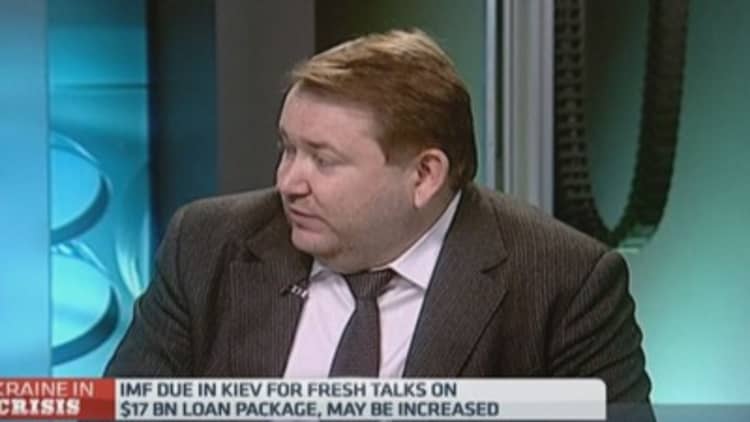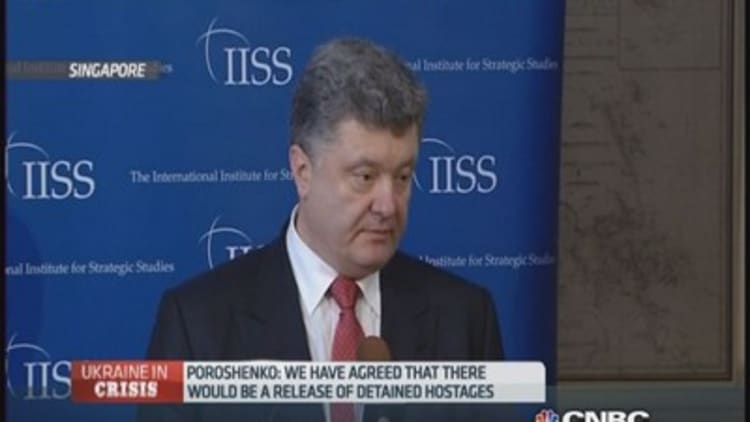
As the International Monetary Fund arrives in Ukraine for fresh talks over a $17 billion aid package, the country's deputy central bank governor told CNBC he hopes the much-needed cash coupled with reforms will revive the economy.
"We are here to deliver reforms in the country, not only to promise them," Vladyslav Rashkovan, acting Deputy Governor of the National Bank of Ukraine, told CNBC Europe's "Squawk Box" on Tuesday.
"We have today we have a new government in place, we have a new parliament in place, a new management board in the national bank and all of us believed in the country," he said, adding that the country had put in place structures to allow for reforms.
Ukraine's economy has stalled since fighting broke out in the east of the country earlier this year between pro-Russian separatists and Ukrainian nationalists. The crisis has deterred international investors and caused the Ukrainian currency, the hryvnia, to plunge 85 percent year-to-date against the dollar.
Read MoreWhy Putin could get 'cold feet' over Ukraine
On Tuesday, Ukrainian President Petro Poroshenko said some 684 hostages were being held illegally by the pro-Russia Donetsk People's Republic. He he called for their immediate release, speaking from a press conference held at the Fullerton Hotel in Singapore.
"The dream of Ukrainians is for our country to become better—free, European, fair and successful," Poroshenko said in a news release published on the day of the conference.
"The support of Japan and Southeast Asia is as important for us as the support of the EU and the United States," he added.

Meanwhile, the IMF is due to arrive in Kiev on Tuesday for lengthy talks over the remainder of a $17 billion bailout package agreed to in spring.
Ukraine was given a first tranche of aid worth just over $3 billion in May, but the country desperately needs more money in order to stay afloat. The IMF's aid package is dependent on the government, led by prime minister Arseniy Yatsenyuk, implementing broad-based economic reforms.
Rashkovan, appointed as acting deputy governor of Ukraine's central bank only a couple of weeks ago, has been charged with overseeing reforms of the country's shaky banking sector. He told CNBC that "lessons were not learnt" from the financial crisis in 2009 and conceded that problems in the country's financial system originated before the crash.
Read MoreWe're ready for 'total war': Ukraine President
"A lot of things, especially in the banking sector, have not been done and even before the financial crisis in 2009 the (issue of the banking sector) was a lot to deal with. We now have to work on it. It's up to us to make it happen," he said.
With the World Bank forecasting that Ukraine will only return to growth in 2016, forecasting that the economy will shrink 8 percent in 2014 and 1 percent in 2015, all eyes are now on the government to see whether it can implement reforms and attract investment. Rashkovan said that tensions in the east were hampering the government's reform efforts.
Read MoreUkraine ceasefire may take hold soon
There are signs, however, that the cold front between Russia and Ukraine caused by the ongoing conflict over territory could be thawing after Ukraine's gas transport monopoly, Ukrtransgaz, said Russia had resumed gas flows to Ukraine on Tuesday, according to Reuters. If supplies continue, it could mean the end of a six-month impasse and disrupt supply caused by a dispute over prices and unpaid debts.
- By CNBC's Holly Ellyatt, follow her on Twitter @HollyEllyatt. Follow us on Twitter: @CNBCWorld



